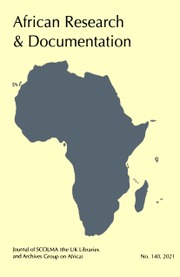No CrossRef data available.
Article contents
The Archivist, the Scholar and the Possibilities of Decolonising Archives in Zimbabwe
Published online by Cambridge University Press: 25 April 2022
Extract
The well-worn routes of colonial history leading to London, Paris, Lisbon, and elsewhere may remain fruitful for historians of the post-colonial period. Since former colonial powers remained involved, or at least interested, in what was going on in their former colonies, intelligence reports and diplomatic materials from the last fifty years may be of value to social scientists of the present. Historians also have turned to records from the United States, the former USSR, and other states with extensive involvement in African politics. The archives of humanitarian groups, non-governmental organizations, newspapers, and other institutions also contain materials produced by African governments. Some intentionally gathered materials, while others accreted them indirectly over the course of their work. (Samuel Fury Childs Daly 2017).
Although Daly's quotation was focused on the post-independence period in Biafra, the sentiments resonate precisely with circumstances elsewhere in understanding African history through the archives.
- Type
- Research Article
- Information
- Copyright
- Copyright © African Research & Documentation 2019
Footnotes
The paper that was presented at SCOLMA 2019 General Conference, Edinburgh was originally titled, “The archivist and the scholar: re-interpretation and re-location of colonial archives”.




